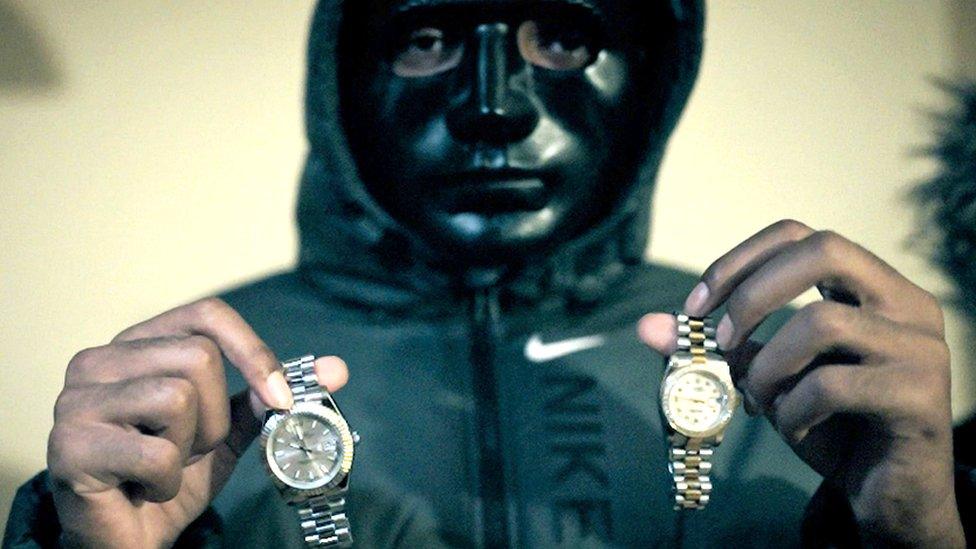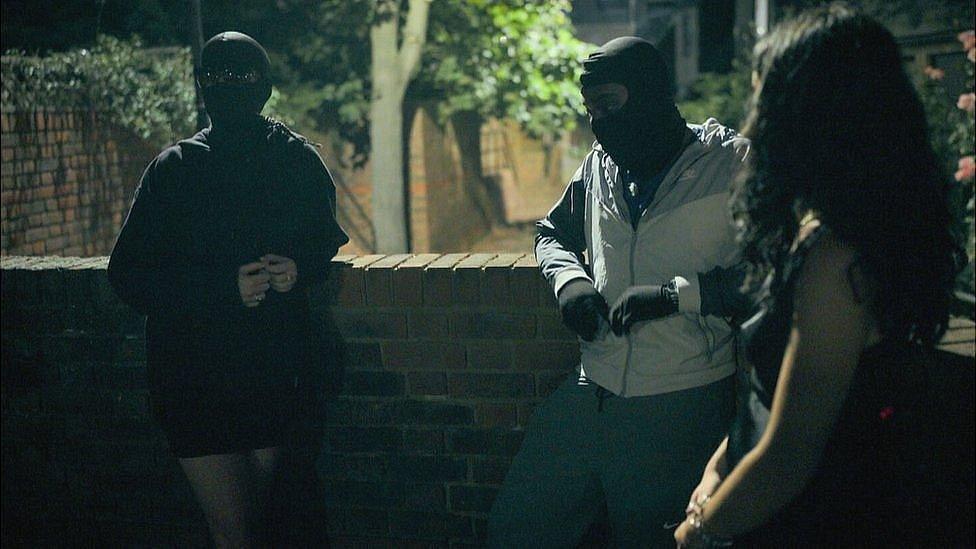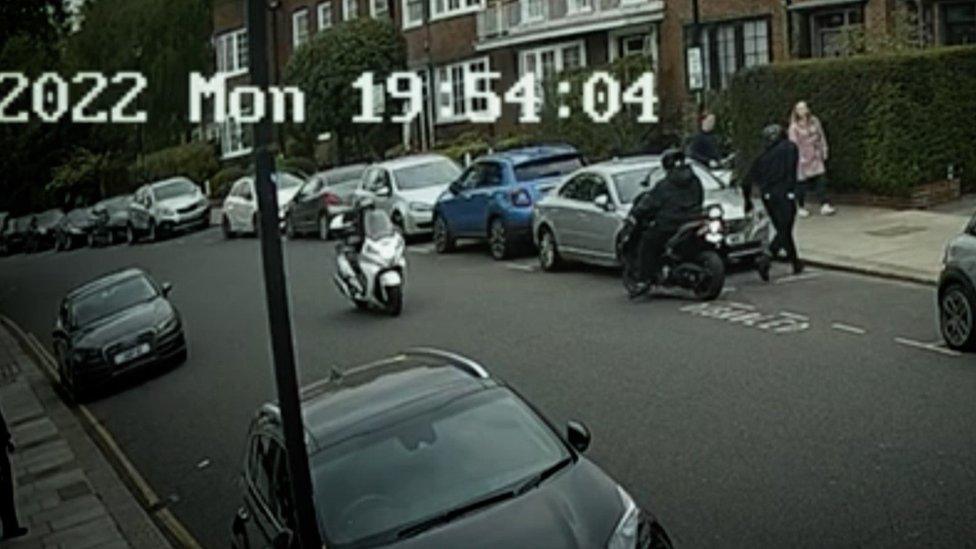Exposing violent watch thieves and their young female 'spotters'
- Published

It's nearly midnight, yet Abi is wearing sunglasses. She also has a balaclava and her hoodie up to disguise her identity. It's clear she's hesitant to talk to me - and Abi isn't even her real name.
I'm nervous to meet her too, in a dark alley on a London housing estate.
Abi is a female "spotter" who works for a London watch theft gang.
Her job is to go to bars and nightclubs in affluent areas of the city to look for potential male victims among the well-dressed clientele.
"I'll talk to the guys, see what they're wearing," she says.
If Abi spots an expensive-looking watch, she gets in touch with gang members who will target the victim wearing it - and rob them, often threatening them with knives and machetes.
I'm talking to Abi to find out why watch theft has become so common - and so violent - for a BBC Three documentary, Hunting the Rolex Rippers.
To expose how they operate, I tracked down numerous watch thieves. Through unprecedented access into their world, I found out how they plan and execute their aggressive attacks.
The Metropolitan Police explained how the thefts were organised crime - and throughout, I asked the thieves if they felt any guilt about what they were doing.
But I'm not alone with Abi. I have been introduced to her by a gang leader, known as M, who is hovering close by, listening to every word Abi tells me.
M says he runs a large network of full-time thieves and describes himself as a "big dog" in the watch theft business. "All I care about is getting the watches, selling the watches and that's it."
M views his victims purely as sources of cash. "He's wearing a deposit for his house on his wrist, that's money for me," he says.

Journalist Tir Dhondy (right) spoke to gang leader M (centre) and young woman "spotter" Abi on a London housing estate
More than £50m-worth of watches were reported stolen in London in 2022, according to a Metropolitan Police FOI, shared exclusively with the BBC by international database The Watch Register.
In the first six months of 2023 in the capital, 3,190 watches were reported stolen according to the Met. Although we don't know exactly how many of these were stolen on the street, a fifth involved violence against the victim.
Celebrities have been targeted too, including Welsh singer and presenter Aled Jones who had his £17,000 Rolex taken from him in west London by a teenager wielding a machete.
In a strange turn of events, while filming the documentary, I was contacted by the 16-year-old who had attacked Mr Jones. He had seen my various messages on different watch-theft Instagram pages.
"I'm a convicted watch thief," he wrote back. "If you want to talk we can."
After agreeing to meet in daylight, he finally showed up after dark. We ended up talking in the back of a car.
The teenager told me his attack had not been planned and he just wanted some quick cash.
"I was walking around this area where I knew I would see something," he told me. "I clocked this guy and followed him for a couple of minutes."
"He went on to a back road where there was nobody there," he adds, "so what I did is, I pulled out the shetty [machete] on him… [It] was roughly 23 inches.
"I told him [to] take off the watch, he gave it to me.
"Half an hour after I robbed him, when I was going back home, the realisation hit me that I'd just done something crazy, something stupid. I regretted it instantly."
During the interview, I noticed the teen had a large machete tucked into his trousers. Nervous about being in the dark in a confined space, we decided we couldn't press him too much and we left.
In October, the teenager was given a 24-month detention and training order after admitting robbery against Mr Jones and possession of an offensive weapon.
We told Mr Jones we had spoken to the teenager - and he said he didn't want to make any further comment.
'Game has no rules'
Gang leader M agrees to meet me in one of the wealthiest parts of London - Mayfair - to show me how he plans his attacks.
We sit in a car outside a high-end restaurant and watch dozens of people - both inside and on the street - wearing top-brand watches. M knows areas like this well and seems to have eyes in many places.
He has a team of young people on mopeds tearing around the streets snatching watches off people, while wielding machetes.
This is our second meeting, but he doesn't seem at ease. With the streets being so busy, it's clear he wants the interview to end as quickly as possible.
We meet up several times in the coming weeks. During one meeting, a pair of thieves bring him a watch they have just stolen. M judges it to be worth about £18,000.
I ask M if he feels responsible for getting young people involved in this crime at such an early age. He says he doesn't. "Listen, everyone needs money, so I don't dive into their prospects and I don't care."
M tells me he studied watches at a young age and decided he wanted to get into stealing them when he was 12.
When I ask if he feels guilty about the violence towards his victims, M says: "No, it don't make me feel bad."

Journalist Tir Dhondy explores the rise in luxury watch theft, meeting the moped riders snatching watches off the street - as well as a gang leader who runs a team of watch rippers.
Watch on Tuesday 5 December, 21:00 GMT on BBC Three and BBC iPlayer.

While filming, I also meet Raz and K, two teenagers who aren't part of a gang, but who work together.
This is not uncommon. I have watched numerous clips of CCTV showing watch thieves operating in pairs.
Raz and K don't reveal their ages to me, but I think they could be as young as 15 or 16.
Like many of the thieves, Raz and K have little sympathy for their victims. "These people can afford to buy the watch in the first place," Raz says. "Is that really a loss? I don't think it's a big loss.
"This is better than drug dealing, in my opinion," he adds. "You might see a grandma walking down the street with a £30,000 watch on."
I say that sounds ruthless - and that stealing from a grandmother could leave her seriously hurt.
"This game has no rules," I am told.
Stealing to order
With many luxury watches having serial numbers on them - making them easy to trace - a lot of the timepieces make it out of the country to places such as Paris, Romania and Dubai.
I want to meet someone higher up the chain involved in the legitimate watch-dealing industry. A reseller who trades luxury brands, but says she doesn't deal in stolen watches herself, agrees to tell me how the watch-theft business works. She is too afraid to show her identity.
"Anyone who works, or has worked, in the industry knows that it's very dirty and full of criminals," she says. "They will get younger people, smaller people down the chain, to steal for them. It's common all over London, Paris and most of Europe… it's done to order.
"It's just a horrible business. It makes me feel sick."

Watch thieves attacked Conservative councillor Andrew Dinsmore. "My wife thought it was a terrorist attack," Andrew says
And to find out what's being done to tackle this type of crime, I go out with the Met Police teams who are patrolling central London - in places like busy Oxford Street.
Sgt Dan Naylor says: "It's easier to steal a watch than a car. No-one is going to have £150,000 in their wallet, but they are going to have it on their wrist."
He says it's down to organised crime and not opportunists.
"They're not just coming in [and] grabbing people's watches off the street, they're doing surveillance work." The stolen watches then go to a handler, he explains, and potentially out of the country or sold on the black market.
Victims of watch-theft gangs tell me about being targeted in this way.
Andrew Dinsmore - a Conservative councillor who had his watch stolen by a thief riding a moped and carrying a machete - believes there was a spotter, like Abi, who was operating in the restaurant he was at with his wife, shortly before his watch was stolen.
"My wife thought it was a terrorist attack," Andrew says. "She thought I was going to be beheaded."
His attackers were jailed.
'I've got bills to pay'
Back on the estate, I ask the spotter Abi, how much money she makes per job. "It really depends, sometimes £500, sometimes £1,000," she says.
I ask if she feels guilty charming these men in a nightclub, before arranging for them to be violently robbed.
"I mean, yeah and no, I do a little bit, but at the same time I've got bills to pay," she says.
As she continues to speak, I can see M getting agitated. He's spotted a couple of men nearby who have put him on edge, and he leaves briefly, returning with a small suitcase.
"Is that a knife?" I ask. "No, something quicker," he replies, flashing me a gun before quickly stashing it in his trousers.
M is wearing a stolen watch. He knows its value and knows that wearing it on the estate is asking for trouble.
"I'm in a deprived area, with a £20,000-£30,000 watch on my wrist."
M was preparing for a fight, so we decided to cut the interview short.
Watch Hunting the Rolex Rippers on Tuesday 5 December, 21:00 GMT on BBC Three and BBC iPlayer.